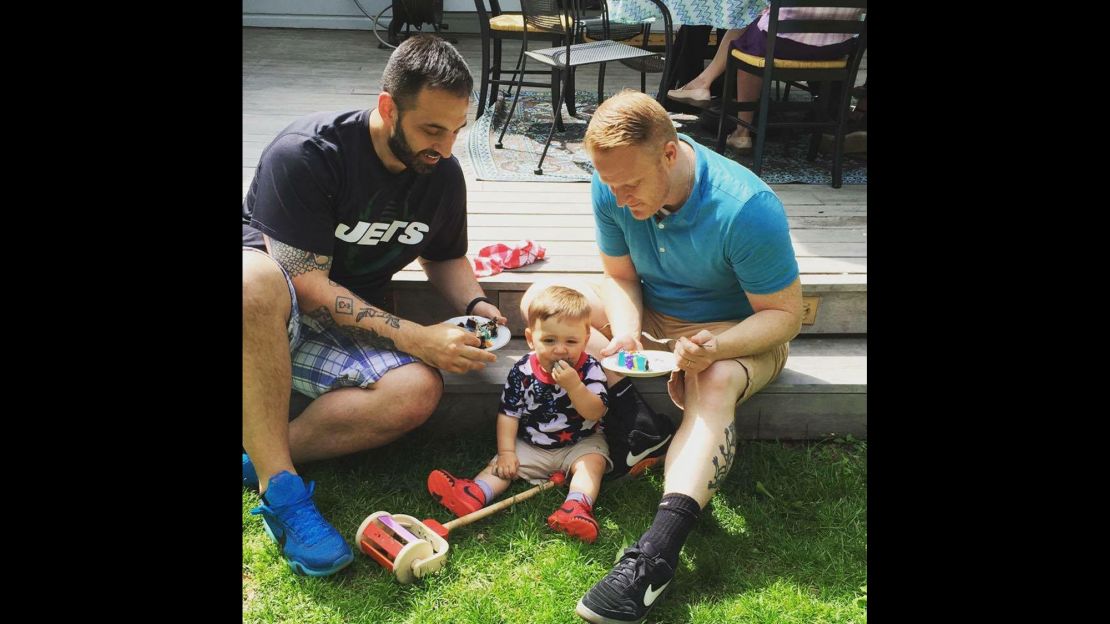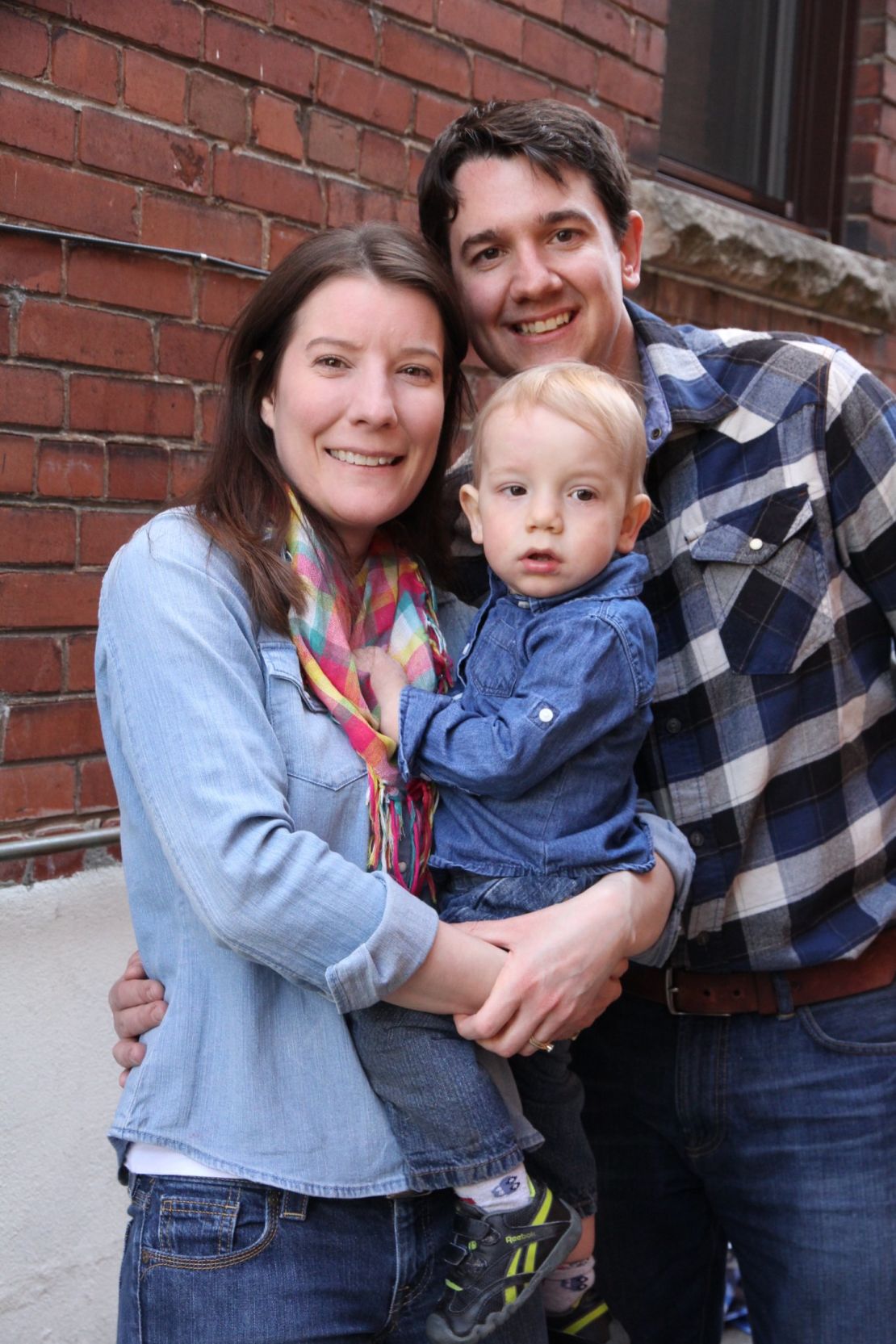Editor’s Note: Kelly Wallace is CNN’s digital correspondent and editor-at-large covering family, career and life. Read her other columns, and follow her reports at CNN Parents and on Twitter.
Story highlights
Millennial dads reported higher work/life satisfaction than single millennial men, according to a report
Millennial dads who split caregiving duties 50/50 with their spouses are said to be happiest
If you are a millennial man and looking for happiness, you might want to think about becoming a dad.
Just in time for Father’s Day comes a new report in which millennial fathers claimed significantly higher levels of satisfaction with their work and home lives than single men.
“When you look at the percentages and the scores, fathers just seemed to have richer, more meaningful lives that they were more satisfied with than their single counterparts,” said Brad Harrington, executive director of the Boston College Center for Work & Family and a co-author of the report.
The report included surveys with 1,100 millennials between the ages of 22 and 35 who had at least two years professional work experience and were employed at one of five large global corporations in the insurance, financial services, accounting and consulting fields.
Dads get more of a (paid) break at work
On the work front, millennial dads were more satisfied with their workplaces and their career achievements than single millennial men and were more likely to stay with their employers, according to the report. With respect to their overall life satisfaction, millennial men were significantly more likely, ranging from 20% to 40% more likely, to feel that their life conditions were excellent, that they’d gotten the important things they wanted in life and that, in most ways, they were living close to their ideal.
The findings are somewhat surprising, especially with research showing that millennials are on track to have the lowest rates of marriage by age 40 than any previous generation.
“Even though people may say, ‘Oh, millennials don’t care about having kids’ … and they may be more reluctant or they may be delaying their decision … (fatherhood) clearly is enriching the lives of these men, at least according to their self-report,” said Harrington.
Rocco Forgione, 35, who with his husband, Corey Martin, is the proud father of 2-year-old Forge, is not at all surprised to hear that millennial dads like him are happier than their single counterparts.

“When I found Corey, I found my heart, and when we had Forge, it filled it up,” he said. “It’s infinite love. I just didn’t know that existed until I had my son, and the things that I used to think about and the things that I used to care about are no longer things I care about at all,” said Forgione, who appears along with Martin and Forge in a new video by Dove Men+Care saluting fathers as heroes in their children’s lives.
The report by the Boston College Center for Work & Family, its seventh on the changing roles of modern fathers, also found that millennial dads, like millennial mothers, are struggling with the stress of trying to “have it all.”
In fact, slightly more millennial dads than millennial moms said it was difficult to combine work and personal life/family, with 15% of moms saying it was difficult, versus 19% of dads.
At the same time, career and career advancement seemed to be slightly more important to millennial dads than millennial moms. Eighty-eight percent of millennial dads said they wanted greater challenges in work versus 74% of millennial moms, and 82% of millennial dads wanted to move up the corporate ladder, versus 69% of millennial moms.
Equal division of labor leads to happiest dads
Perhaps the finding that might be most significant to parents of all ages is this: Those millennial dads who divided caregiving responsibilities equally with their spouses reported higher levels of work and life satisfaction. Higher, at least, than the fathers who believed their spouses should – and did – handle more of the caregiving responsibilities and the fathers who were described as conflicted, because they thought that caregiving should be divided equally but their spouse was doing more than they were. (Harrington, the study co-author, conceded that he falls into that “conflicted” category.)
The so-called egalitarian dads, who divided things equally with their spouses, scored higher than their counterparts when it comes to being respected at work and feeling part of a group in their workplaces.
Egalitarian dads also scored well ahead of the other dads in strongly agreeing with statements such as “If I had to live my life over, I would change almost nothing” and in strongly agreeing that their life conditions were excellent and that they were satisfied with their lives.
“What was interesting to me was how pleased egalitarian fathers seem to be with themselves and their arrangement,” said Harrington, who is also a research professor for the Boston College Center for Work & Family. “You would have thought they were running themselves ragged trying to be doing it all, but that wasn’t the way they depicted their life either at work or at home.”
Jonathan Lee of Toronto fits the description of an egalitarian dad. (At 38, he is just slightly older than a millennial.) His wife leaves early for her corporate communications position, so Lee gets their 2-year-old son up in the morning and gets him ready for day care. He and his wife then come home, have dinner and enjoy some quality time together with their son before getting back on their laptops after their son goes to bed.

“We both sort of share all duties in the house. When it comes to that, we just sort of figured out the best schedule that makes sense,” said Lee, one of the co-founders of Grapevine6, a suite of apps which help individuals and corporations connect with related content.
Forgione said that even though his husband works full-time and he is the stay-at-home dad, they split all caregiving duties 50/50. On weekdays, his husband will handle the morning routine before he goes off to work, and then Forgione takes care of Forge all day. On weekends, it’s almost like they switch roles.
“I’ll come up with a schedule of what we will do, but when we go to those places, I’m carrying the diaper bag, stroller and … Forge’s bottle, and Corey’s job is to make sure Forge is interacting and having fun,” said Forgione, who lives in Mamaroneck, a suburb of New York. “He takes care of Forge, and I’m taking care of Corey as he takes care of Forge.”
Feminists have certainly been promoting egalitarian roles and saying they are good for everybody, Harrington said, but he believes that his research includes some of the first hard data on how good it really can be, at least for egalitarian dads.
Join the conversation
“It’s not that we are trying to advocate that everyone should be egalitarian, but what we’re saying is that the ones who said they were seem to have higher levels of satisfaction overall than the traditional (dads) and certainly than the conflicted people like me.”
Are you surprised that millennial fathers are happier than their single counterparts? Share your thoughts with Kelly Wallace on Twitter @kellywallacetv or CNN Parents on Facebook.
















